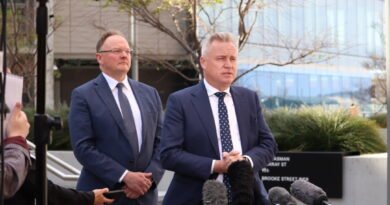Australia Implements Stricter Punishments for Hate Crimes: Mandatory Jail Sentences
Now, anyone displaying Nazi or terrorist symbols will face a mandatory minimum prison sentence of at least one year.
The Australian Parliament recently passed new hate speech laws that impose harsher penalties, including mandatory minimum prison terms for showcasing terror symbols and committing specific terrorism-related offenses.
This legislation, approved by the Senate on Feb. 6, introduces new violations targeting threats of violence against particular groups based on race, religion, sexual orientation, gender identity, disability, or political opinion.
Under these updated laws, exhibiting Nazi or terrorist symbols will result in a mandatory one-year jail term.
Penalties increase to three years for funding terrorism and six years for other terrorism offenses.
Assisting law enforcement could lead to a sentence reduction of up to 25 percent.
An amendment, supported by the opposition and Labor, also extends the law to cover instances of property damage advocating force or violence.
The Greens eventually joined the major parties in supporting the bill, while six senators—Ralph Babet, Fatima Payman, Gerard Rennick, Tammy Tyrrell, Alex Antic, and David Pocock—voted against it.
Mandatory Minimums Added After Pressure and Debate
This introduction of mandatory minimum prison terms follows intense debate and pressure from the opposition, particularly regarding the increase in anti-Semitic incidents.
Initially, Prime Minister Anthony Albanese and the Labor Party had reservations about mandatory minimums, expressing concerns about judicial independence and efficacy.
However, a series of violent episodes, such as the firebombing of a synagogue and the discovery of a vehicle with explosives and a list of Jewish targets, led to a change in position.
“We aim for individuals engaged in anti-Semitic activities to be apprehended, charged, and incarcerated—that’s our top priority,” stated Prime Minister Albanese to Townsville reporters.
Critics Warn of Risks
Despite widespread support for the bill, the amendments faced opposition from the Green Party and various crossbench members.
Greens Senator Mehreen Faruqi argued that mandatory sentences are “unfair, inappropriate, and highly discriminatory.”
She accused the Prime Minister of yielding to the opposition and abandoning Labor’s anti-mandatory sentencing stance.
Greens Senator David Shoebridge echoed these sentiments, stating that mandatory sentencing does not effectively deter crime and undermines judicial autonomy.
He highlighted that many Labor MPs had previously opposed mandatory sentencing, emphasizing that punishments should be decided by judges, not politicians.
“Mandatory minimum sentences are unacceptable, and they will inevitably result in fewer convictions,” Shoebridge remarked.
Independent MP Zali Steggall also expressed concerns, stating, “Just in a lift with MPs. They didn’t know what they were heading down to vote on: Mandatory sentencing. Major parties MPs currently voting in support of mandatory sentencing without even turning their mind to what it means. This circumvents the role of the courts & is dangerous.”
Coalition Says Dutton’s Influence Drove Harsher Hate Crime Laws
Opposition members credit Peter Dutton for pushing the inclusion of mandatory sentences, noting that he “has once again led the way” in national security and social unity.
“Last night in the Federation chamber, the Albanese Labor government yielded to Mr. Dutton’s demands for strong mandatory penalties and new offenses for anti-Semitic attacks,” stated Senator Cash.
Meanwhile, Senator James Paterson accused the government of delaying the bill and only passing it after significant harm was done.
He mentioned that the bill was initially introduced with bipartisan support in September, but action was delayed until after Christmas.
“Unfortunately, our worst fears materialized, and a summer of terror was unleashed against the Jewish community,” he said.
“Anybody who says that hate speech is somehow a subset of freedom of speech doesn’t understand that words can be bullets,” affirmed Home Affairs Minister Tony Burke.
AAP contributed to this article.





